Herbal teas can be a game changer for easing joint pain and inflammation. Start with turmeric and ginger tea for their strong anti-inflammatory properties. Willow bark tea serves as a natural pain reliever, while nettle leaf tea supports detoxification. For relaxation, chamomile and peppermint teas can ease tension. Green tea, rich in antioxidants, enhances overall joint health. Cinnamon and rooibos teas also combat inflammation and boost mobility. Regularly enjoying these herbal teas can greatly improve your comfort and mobility. Keep exploring to find out more about these beneficial brews and how to incorporate them into your daily life!
Turmeric Tea
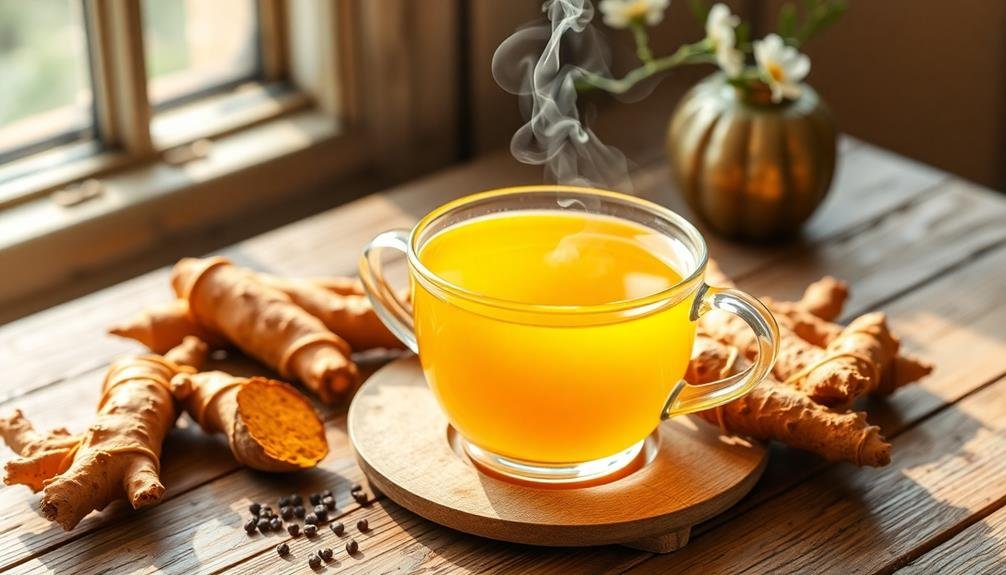
Have you ever wondered how turmeric tea can benefit your joints? This golden-hued drink is packed with curcumin, a powerful anti-inflammatory compound that can help reduce joint pain and stiffness.
When you sip on turmeric tea, you're giving your body a natural way to combat inflammation, which is often the root cause of arthritis and other joint issues. Drinking turmeric tea regularly can also improve your overall mobility.
It works by blocking the inflammatory pathways in your body, making it easier for you to move without discomfort. Plus, the antioxidants in turmeric strengthen your immune system, which can lead to better joint health over time.
To prepare turmeric tea, simply mix a teaspoon of turmeric powder in hot water, add a pinch of black pepper to enhance absorption, and sweeten it with honey if you like. You can also include a splash of lemon for added flavor and vitamin C.
Incorporating turmeric tea into your daily routine can be a simple yet effective way to support your joints. So why not give it a try and experience the soothing effects for yourself? Your joints will thank you!
Ginger Tea
When you're looking for a natural remedy for joint pain, ginger tea is a top contender. This aromatic beverage is packed with anti-inflammatory properties that can help reduce swelling and discomfort.
Ginger contains gingerol, a compound known for its ability to alleviate pain, making it an excellent choice for those struggling with joint issues.
To prepare ginger tea, simply peel and slice fresh ginger root, then steep it in boiling water for about 10-15 minutes. You can add honey or lemon for extra flavor and health benefits. Drinking this tea regularly can promote better joint health and improve your overall well-being.
In addition to its pain-relieving qualities, ginger tea can also enhance circulation, which can be beneficial for your joints.
Willow Bark Tea

If you're exploring more herbal options for joint pain relief, willow bark tea is worth considering. This tea, made from the bark of the willow tree, has been used for centuries for its anti-inflammatory properties. It contains salicin, a compound similar to aspirin, which can help alleviate pain and reduce inflammation.
Here's a quick comparison of willow bark tea's benefits:
| Benefits | Description |
|---|---|
| Pain Relief | Acts similarly to aspirin, easing joint pain. |
| Anti-Inflammatory | Reduces inflammation, potentially improving mobility. |
| Natural Alternative | A herbal option for those avoiding synthetic medications. |
| Digestive Friendly | Often gentler on the stomach compared to aspirin. |
To prepare willow bark tea, steep a teaspoon of dried bark in hot water for about 10-15 minutes. You can drink this up to three times a day. However, consult your healthcare provider if you're on other medications, as it may interact with certain drugs. Willow bark tea could be a supportive addition to your routine for managing joint pain, providing a natural remedy that many find effective.
Nettle Leaf Tea
Nettle leaf tea is packed with anti-inflammatory properties that can help ease joint pain.
You'll also find it offers several nutritional benefits, making it a great addition to your wellness routine.
Let's explore how to prepare this herbal tea for maximum benefits.
Anti-inflammatory Properties
You might be surprised to learn that nettle leaf tea is packed with anti-inflammatory properties, making it a powerful ally for those suffering from joint pain. This herbal tea can help reduce inflammation and alleviate discomfort, allowing you to move more freely and comfortably. The compounds in nettle, such as flavonoids and phenolic acids, work together to combat the inflammation that often accompanies joint issues.
Here's a quick overview of nettle leaf tea's anti-inflammatory effects:
| Component | Effect on Inflammation | Additional Benefits |
|---|---|---|
| Flavonoids | Reduces swelling and pain | Supports immune function |
| Phenolic Acids | Inhibits inflammatory markers | Antioxidant properties |
| Silica | Promotes joint health | Strengthens connective tissue |
| Vitamin K | Reduces inflammatory response | Aids in bone health |
| Minerals (e.g., Magnesium) | Relieves muscle tension | Supports overall wellbeing |
Nutritional Benefits
Beyond its impressive anti-inflammatory properties, nettle leaf tea offers a wealth of nutritional benefits that can further support joint health. When you sip on this herbal infusion, you're not just treating your joints; you're also nourishing your body with essential vitamins and minerals.
Here are some key nutritional benefits of nettle leaf tea:
- Rich in Vitamins A, C, and K: These vitamins help strengthen your immune system and promote overall health.
- High in Antioxidants: Antioxidants combat free radicals, which can reduce oxidative stress and inflammation in your joints.
- Contains Essential Minerals: Nettle leaf is a great source of calcium, magnesium, and potassium, all important for maintaining strong bones and healthy muscle function.
- Supports Detoxification: Nettle acts as a natural diuretic, helping your body eliminate toxins that could otherwise aggravate joint pain.
Incorporating nettle leaf tea into your daily routine not only provides these nutritional perks but also encourages overall wellness.
By leveraging its benefits, you can take proactive steps toward managing your joint health effectively.
Preparation Methods
When it comes to preparing nettle leaf tea, there are several effective methods that can enhance its flavor and benefits. You can choose from traditional steeping, cold infusion, or blending with other herbs. Each method has its unique advantages.
Here's a quick guide to help you decide:
| Preparation Method | Description |
|---|---|
| Traditional Steeping | Boil water, add dried nettle leaves, steep for 5-10 minutes, and strain. This method extracts the most nutrients and flavor. |
| Cold Infusion | Place dried nettle leaves in cold water and let it sit in the fridge for 6-12 hours. This method is gentler and preserves delicate flavors. |
| Blending with Other Herbs | Combine nettle with herbs like ginger or peppermint for added flavor and benefits. Simply steep together to create a unique blend. |
No matter which method you choose, always use high-quality dried nettle leaves for the best results. Experiment with the steeping time and ratios to find your perfect cup. Enjoy the soothing effects of nettle leaf tea while easing your joint pain!
Chamomile Tea

Chamomile tea, renowned for its calming properties, also offers potential relief for joint pain. This herbal wonder is packed with anti-inflammatory and antioxidant compounds, which can help reduce swelling and discomfort in your joints. Drinking chamomile tea may not only soothe your mind but also ease the physical discomfort you experience.
Here are some key benefits of chamomile tea for joint pain:
- Anti-inflammatory properties: Helps reduce swelling and inflammation in joints.
- Antioxidant-rich: Fights oxidative stress that can worsen joint pain.
- Relaxation aid: Promotes relaxation, which can help alleviate tension in the body.
- Natural remedy: A safe, caffeine-free option for daily consumption.
To prepare chamomile tea, simply steep dried chamomile flowers in hot water for about 5 minutes. You can sip on it throughout the day or enjoy it before bed for additional relaxation.
Whether you're dealing with arthritis or general joint discomfort, incorporating chamomile tea into your routine could be a gentle and effective way to find some relief.
Just remember to consult your healthcare provider if you have any concerns or are on medication.
Peppermint Tea
When you're looking for relief from joint pain, peppermint tea might just be the answer.
Its anti-inflammatory properties can help reduce discomfort, while its natural pain relief benefits make it a go-to choice.
Plus, preparing peppermint tea is simple and can easily fit into your daily routine.
Anti-inflammatory Properties
Peppermint tea stands out for its impressive anti-inflammatory properties, making it a valuable ally in managing joint pain. When you sip on this invigorating herbal brew, you're not just enjoying a delightful taste; you're also supporting your body's ability to reduce inflammation.
Here are a few ways peppermint tea can help:
- Rich in Antioxidants: It contains components that combat oxidative stress, which can exacerbate inflammation.
- Menthol Content: The menthol in peppermint has natural anti-inflammatory effects, soothing soreness in your joints.
- Digestive Aid: By improving digestion, peppermint tea helps reduce the overall inflammatory response in your body.
- Stress Reduction: The calming aroma of peppermint can lower stress levels, which is linked to inflammation.
Incorporating peppermint tea into your daily routine can offer more than just comfort. It can help you take proactive steps towards managing inflammation.
Pain Relief Benefits
Building on its anti-inflammatory properties, peppermint tea also offers notable pain relief benefits that can be particularly helpful for those dealing with joint discomfort. The menthol in peppermint acts as a natural analgesic, providing a cooling sensation that can soothe aching joints. This cooling effect not only helps to numb pain but can also reduce inflammation, making it easier for you to move freely.
When you drink peppermint tea, you may find relief from muscle tension and stiffness, which often accompany joint pain. Its relaxing properties can help alleviate stress, further contributing to your overall comfort.
Additionally, the aroma of peppermint can enhance your mood, creating a more positive environment for managing pain.
Incorporating peppermint tea into your daily routine can be a simple yet effective way to combat joint discomfort. By sipping on this invigorating herbal tea, you're not only hydrating your body but also tapping into the natural pain relief it provides.
Preparation Methods
To whip up a soothing cup of peppermint tea, start by gathering fresh peppermint leaves or high-quality dried tea. This invigorating brew not only tastes great but also offers benefits that can help ease joint pain. Here's what you'll need:
- Fresh peppermint leaves or dried tea
- Hot water (just off the boil)
- A teapot or a mug
- Honey or lemon (optional for flavor)
Once you've got your ingredients ready, follow these simple steps:
- If you're using fresh leaves, gently rinse them under cold water. For dried tea, measure about one teaspoon per cup.
- Place the leaves or tea in your teapot or mug.
- Pour hot water over the leaves and let it steep for about 5 to 10 minutes, depending on how strong you want the flavor.
- Strain out the leaves, add honey or lemon if desired, and enjoy your warm, aromatic peppermint tea.
Sip slowly, letting the soothing warmth help ease any discomfort you might be feeling in your joints.
This simple preparation method can become a comforting ritual in your daily routine.
Green Tea
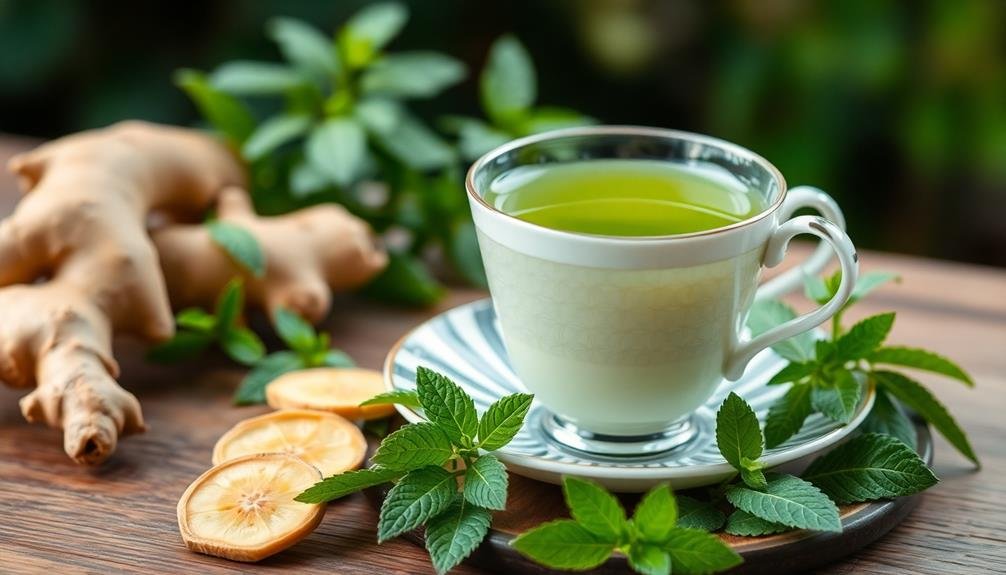
Packed with antioxidants, green tea has gained popularity not just for its invigorating taste but also for its potential benefits in alleviating joint pain. The key player here is epigallocatechin gallate (EGCG), a powerful compound that may help reduce inflammation and protect joint tissues. By sipping on green tea regularly, you might find that it supports your overall joint health.
Here's a quick comparison of the benefits of green tea:
| Benefit | Description | How It Helps Joint Pain |
|---|---|---|
| Antioxidant-rich | High in polyphenols, particularly EGCG | Reduces oxidative stress |
| Anti-inflammatory | May inhibit inflammatory markers | Lessens joint swelling |
| Supports metabolism | Aids in weight management, which can ease stress on joints | Reduces pressure on joints |
| Improves blood flow | May enhance circulation | Delivers nutrients to joints |
| Boosts immunity | Strengthens the immune system | Helps prevent joint-related conditions |
Incorporating green tea into your daily routine could be a simple yet effective way to support your joint health. So why not brew a cup and enjoy its benefits today?
Cinnamon Tea
Cinnamon tea, with its warm and comforting aroma, offers more than just a delightful flavor; it's also known for its potential benefits in easing joint pain. The active compounds in cinnamon, particularly cinnamaldehyde, have anti-inflammatory properties that can help reduce swelling and discomfort in your joints.
Incorporating this aromatic tea into your daily routine could provide you with some much-needed relief.
Here are some reasons to ponder cinnamon tea for your joint pain:
- Anti-Inflammatory Effects: Helps reduce inflammation and pain in joints.
- Antioxidant Properties: Fights free radicals, promoting overall joint health.
- Improved Circulation: Enhances blood flow, which can aid in recovery.
- Natural Flavor Booster: Enjoy a tasty alternative to traditional pain relief.
To brew a comforting cup, simply steep a cinnamon stick or ground cinnamon in hot water for about 10-15 minutes. You can even add honey or lemon for extra flavor.
Whether you sip it in the morning or as a soothing evening drink, cinnamon tea can be a simple yet effective addition to your wellness journey.
Rooibos Tea
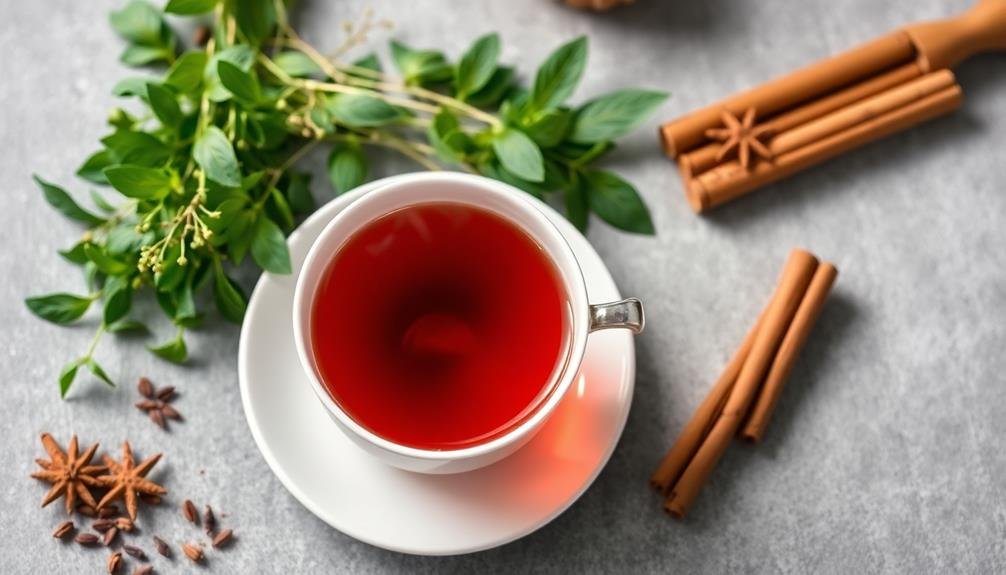
If you're looking for a natural way to ease joint pain, rooibos tea might be your answer.
This herbal tea is packed with anti-inflammatory properties and rich in antioxidants, making it a great addition to your wellness routine.
Let's explore how to prepare it and get the most benefits from it.
Anti-inflammatory Properties
Rooibos tea embodies a rich tapestry of anti-inflammatory properties that can greatly benefit those suffering from joint pain. This herbal brew, derived from the Aspalathus linearis plant, contains compounds that help reduce inflammation in your joints, making it a soothing choice for relief.
Here are some key benefits of rooibos tea's anti-inflammatory properties:
- Alleviates Swelling: Regular consumption can help reduce swelling in affected joints.
- Supports Joint Mobility: Its anti-inflammatory effects may improve overall joint flexibility.
- Reduces Pain: The tea's natural compounds can ease discomfort associated with arthritis and other joint issues.
- Promotes Recovery: Drinking rooibos can aid in recovery from joint-related injuries by minimizing inflammation.
Incorporating rooibos tea into your daily routine can be a simple yet effective way to combat joint pain. By making this delightful beverage a part of your self-care regimen, you might find some much-needed relief.
Plus, its naturally sweet flavor means you can enjoy it without added sugars. So, why not brew a cup today and give your joints the soothing attention they deserve?
Rich Antioxidant Content
While many herbal teas offer health benefits, rooibos tea stands out for its impressive antioxidant content, which can play an important role in managing joint pain. Antioxidants combat oxidative stress, a key factor in inflammation and joint discomfort. By incorporating rooibos tea into your routine, you're giving your body a powerful ally in the fight against free radicals.
Rooibos is rich in compounds like aspalathin and nothofagin, which are known for their potent antioxidant properties. These compounds help to reduce inflammation and protect your joints from damage, promoting better mobility and overall comfort.
Drinking rooibos tea can also support your body's natural defenses, making it easier for you to cope with everyday stressors that may exacerbate joint issues.
Moreover, rooibos tea is caffeine-free, so you can enjoy a warm cup any time of the day without worrying about disrupting your sleep. Whether you sip it in the morning or wind down with it at night, you're not only indulging in a delicious drink but also nourishing your body with crucial antioxidants.
Embrace the benefits of rooibos tea and take a step toward easing your joint pain.
Preparation and Usage Tips
To fully reap the benefits of rooibos tea, knowing how to prepare and use it effectively is key. This naturally caffeine-free herbal tea isn't only delicious but also packed with antioxidants that can help ease joint pain. Here are some tips to get you started:
- Choose Quality Tea: Opt for organic rooibos tea to guarantee you're getting the purest form without additives.
- Brewing Time: Steep your rooibos tea for about 5-7 minutes. This duration allows for maximum flavor and nutrient extraction.
- Water Temperature: Use boiling water (around 200°F or 93°C) to fully release the antioxidants.
- Additions for Flavor: Enhance your tea with a slice of lemon, a dash of honey, or even a sprinkle of cinnamon for additional health benefits.
After brewing, enjoy your rooibos tea warm or let it cool for a revitalizing iced version.
Consuming this tea regularly can contribute to reducing inflammation and promoting overall joint health. Incorporate it into your daily routine, and you might just find relief from those persistent aches and pains.
Boswellia Tea
Discovering the benefits of Boswellia tea can be a game changer for those seeking relief from joint pain. This herbal tea, made from the resin of the Boswellia tree, is packed with potent anti-inflammatory properties that help reduce swelling and discomfort in your joints.
When you brew Boswellia tea, you're not just enjoying a warm beverage; you're also harnessing its ability to improve mobility and ease stiffness.
To prepare Boswellia tea, steep 1-2 teaspoons of dried Boswellia resin in hot water for about 10 minutes. You can enhance the flavor with honey or lemon if you like, making it a soothing addition to your daily routine. Aim to drink this tea 2-3 times a day to experience maximum benefits.
Incorporating Boswellia tea into your regimen may also help you manage conditions like arthritis and osteoarthritis. Many people report noticeable improvements in their joint health after consistent consumption.
Just remember, it's always best to consult with a healthcare professional before adding new supplements or herbal teas to your routine. With a little patience, you may find that Boswellia tea offers the relief you've been searching for.
Frequently Asked Questions
Can Herbal Teas Replace Conventional Pain Medication for Joint Pain Relief?
Herbal teas can complement your pain management routine, but they shouldn't fully replace conventional medications. You should consult your healthcare provider to find the best approach for effectively managing your joint pain.
Are There Any Side Effects Associated With These Herbal Teas?
Yes, some herbal teas can cause side effects like allergies, digestive issues, or interactions with medications. It's important you consult your healthcare provider before trying new herbal teas, especially if you have underlying health conditions.
How Long Does It Take to Feel Relief From Drinking Herbal Teas?
When you drink herbal teas, you might start feeling relief within 30 minutes to a couple of hours. However, consistent consumption over days or weeks often leads to more noticeable, longer-lasting benefits. Stay patient!
Can I Mix Different Herbal Teas for Joint Pain Relief?
Yes, you can mix different herbal teas for joint pain relief. Combining ingredients like ginger, turmeric, and chamomile might enhance their benefits. Just make certain you enjoy the flavors and listen to your body's response.
Should I Consult a Doctor Before Starting Herbal Tea for Joint Pain?
Yes, you should consult a doctor before starting herbal tea for joint pain. They'll help guarantee it's safe for you, considering any medications or conditions you have, and provide personalized advice based on your situation.
In Summary
Incorporating these herbal teas into your daily routine can be a soothing way to ease joint pain. Each option offers unique anti-inflammatory properties and potential relief. Whether you prefer the warmth of turmeric tea or the calming effect of chamomile, you've got plenty of choices to explore. So, grab your favorite mug, brew a cup, and enjoy the natural benefits these teas can bring to your joints. Cheers to feeling better and embracing a more comfortable life!

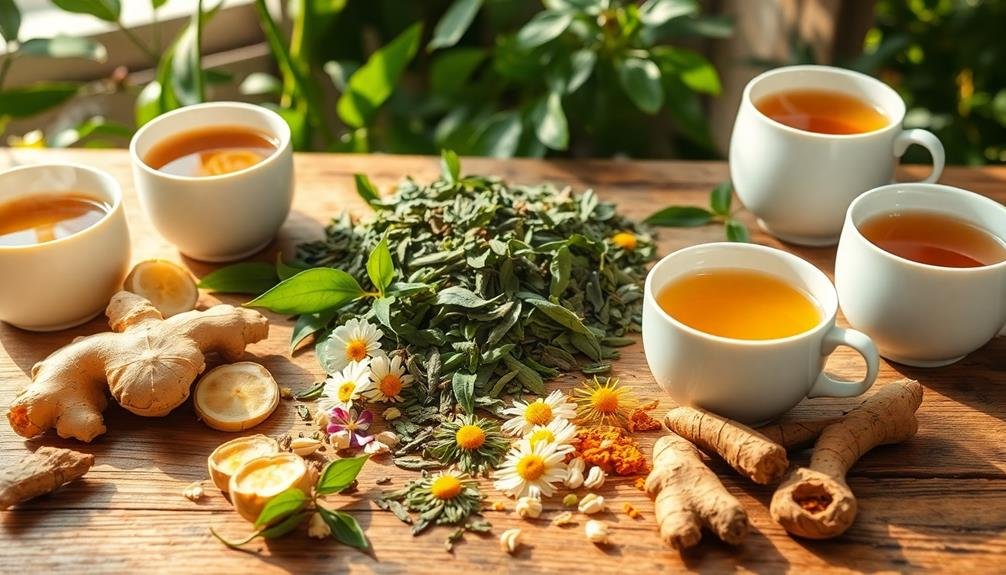

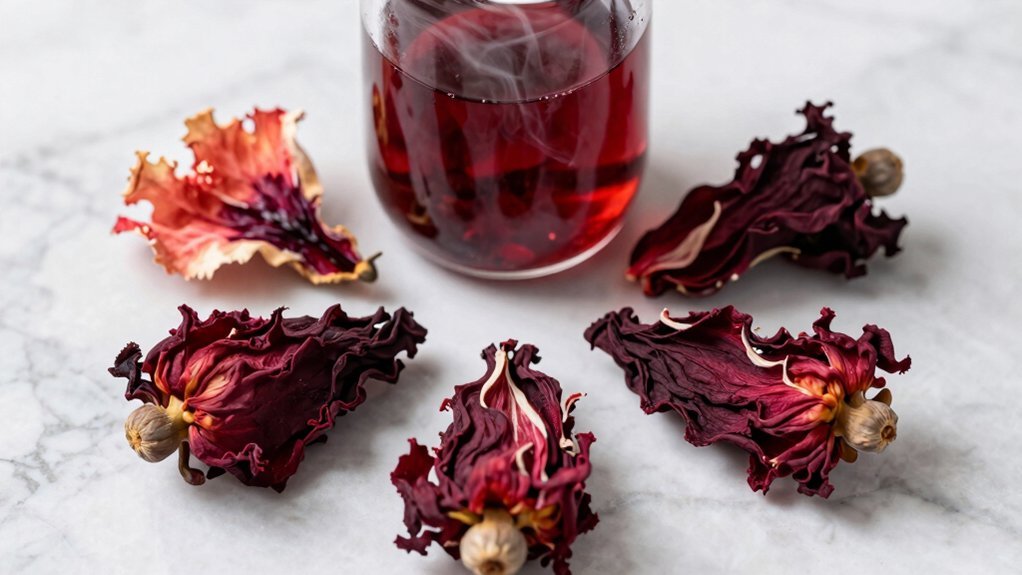

Leave a Reply